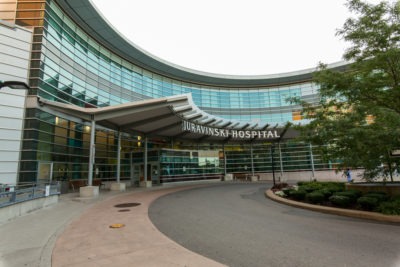For information about visiting during the COVID-19 pandemic, please visit our Appointments & Visiting page.
We provide post-operative (after surgery) care for patients who have a joint replacement surgery. Joint replacement surgery, also called arthroplasty, is often needed for people who suffer from conditions such as osteoarthritis, rheumatoid arthritis or injury affecting the hip and knee.
Care We Provide
During your stay, you will be cared for by a team of dedicated health care providers who will assist you with your recovery and prepare you to care for yourself at home.
Getting Ready for Surgery
One of the most common reasons for a joint replacement is damage caused by osteoarthritis. Osteoarthritis (OA) is a form of arthritis that causes the joints to wear out. Osteoarthritis usually affects the hips and knees and can result in pain and difficulty moving.
Getting a new hip or knee is major surgery and recovery takes time. With hard work and a positive outlook, you can get back to being active and enjoying life.
Building your muscle strength before surgery will not only give you more energy before surgery, it will help with your recovery after surgery. To help you get in shape, you may want to try some of these options:
- YMCA – Live Well INMotion Program for people wanting to improve their health before and after having hip or knee joint replacement surgery.
- Community gym or pool
- Physiotherapy
- Hydrotherapy
- Going for daily walks
Hip and Knee Education Class - Virtual
At this time we are not providing in person education classes. We are providing online education in the form of videos, booklets and resource material. This will help you learn more about your surgery, hospital stay and prepare you for when you are discharged home.
Videos
You will need to watch two videos to help prepare you for your surgery and recovery. Please watch the Your Hospital Stay video and either the Your New Hip or Your New Knee video.
Booklets
These booklets provide information that will help you prepare for hip or knee joint replacement surgery and will tell you what to expect when you are in the hospital. Documents open in a PDF.
Resource material
The following documents are mentioned in the booklets and videos and provide information related to your surgery and recovery. Documents open in a PDF.
Hamilton Health Sciences Planning Checklist- knee or hip surgery
Hip and Knee Arthroplasty Checklist for Surgery
Instructions for showering with Chlorhexidine sponge – new hip and new knee surgery
Physiotherapy after surgery- list of Clinics
Where to purchase/rent home health equipment supplies in Hamilton and area
General information for hospital stay:
Working with you to reduce the risk of falls while in the hospital
Pre-op Clinic Visit
You may be asked to attend a Pre-Op Clinic visit before your joint replacement surgery. This clinic visit may take up to 3 to 4 hours. You will be notified by your surgeon’s office about this appointment.
Please bring a list of all medications including vitamins, minerals, plus herbal or natural supplements you take at home. If possible, bring your medications in their original containers. You may also have some tests such as an ECG (heart test), an Echocardiogram (images of your heart), blood tests and an x-ray.
After Surgery
What to watch for
Infection: Some bruising, redness and swelling around the staples is normal and does not always mean an infection. Bacteria in your blood can get into your new hip or knee and cause an infection.
Signs of infection are:
- Increasing redness around the incision (the cut in your skin from surgery)
- Swelling
- Drainage from the incision (fluid coming out of the incision)
- Increased pain
- Fever above 38°C or 100° F
Dislocation: If your hip or knee cap or moves out of place, you may notice:
- An increase in pain.
- A change in where you feel pain in your hip or knee.
- A change in the shape of your hip or knee.
- Your hip or knee becomes stuck in one position.
- You will be unable to bear weight.
If you have any signs of infections or dislocation, contact your surgeon right away. A dislocation or infection must be treated right away.
Dental work or other surgery
Tell your dentist and other doctors that you have had hip replacement surgery. You may need to take medication to prevent an infection in your hip or knee.
Exercises
You must keep doing your exercises on your own at home to strengthen your muscles and get your hip or knee moving well. View the hip exercise booklet and the knee exercise booklet. If you have had a hip replacement, it is important that you follow the Hip Rules listed in Your New Hip booklet. If your surgeon tells you that your hip replacement is a “direct anterior approach”, you will not need to follow the Hip Rules.
Team Members
The healthcare team that will be involved with your care include:
- Orthopaedic surgeons
- Physicians
- Residents
- Nurses
- Business clerks
- Physiotherapists
- Occupational Therapists
- Physiotherapy/Occupational Therapy Assistants
- Environmental Aides
- Social Worker
- Dietitian
- Pharmacist

